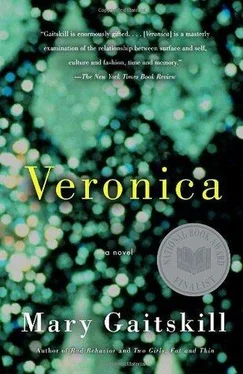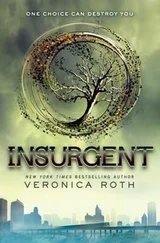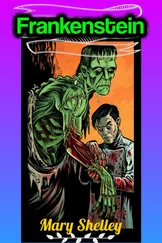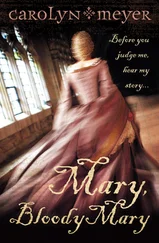“Every day after that, I brought in a can of food and every day the men would gather to watch Baldie eat. It was probably one of the few times they got to see a righteous need completely satisfied. When I quit, I left a case of food. I like to think they kept it up. They were hard people, but they had real hearts.” She shrugged. “That was the good thing that happened there.”
I come to a clearing filled with little sticks poking out of the ground. Whatever they had been, somebody had chopped them off. Hard people, real hearts. So many of Veronica’s stories were coarse and sentimental. Another time, she told me about being raped by a man who broke into her apartment. He said he was going to kill her, but she talked him out of it. “I told him, ‘If you kill me, you won’t be killing just one person. You’ll be killing my parents. They’re old and it would kill them to know their daughter died like that.’ ” She shrugged and held out her hands like a Borscht Belt comedian. “And he didn’t!” She smoked luxuriously and leaned back in her chair, into the sky with red writ across it. “He was very tender.” Her voice deepened; it became fulsome, indulgent, almost smug. “My rapist was very tender.”
Smart people would say she spoke that way about that story because she was trying to take control over it, because she wanted to deny the pain of it, even make herself superior to it. This is probably true. Smart people would also say that sentimentality always indicates a lack of feeling. Maybe this is true, too. But I’m sure she truly thought the rapist was tender. If he’d had a flash of tenderness anywhere in him, a memory of his mother, of himself as a baby, of a toy, she would’ve felt it because she was desperate for it. Even though it had nothing to do with her, she would’ve sought it, reaching for it as it sank away in a deep pool. I’ll be looking at the moon, but I’ll be seeing—
I see myself, home for Christmas. There I am in the warm kitchen, seasonal music coming from the living room in great swollen chords. I see the red mixing bowl on the counter. I see the mixer, mashed potatoes stuck to its dull blades. My mother opens the oven; there is a golden turkey sweating juice. My father sits in his living room chair, his eyes like deep holes full of layered visions invisible to us. Good King Wenceslas looks down at pictures flashing on the mute TV. A local family is turned out of their apartment; alone and defiant, the mother leads her children down the hall, her eyes flaring into the camera. My mother stirs hunks of butter into the peas; she lays the pecan pies out on tattered pot holders. The local family finds shelter with a church group that has pledged to help them. Daphne decorates the tree with nimble, loving gestures. The children accept stuffed toys from strangers; their mother smiles and rapidly blinks. I light the red candles and put them on the dining room table. Rows and rows of wonderful cars are for sale. Santa takes aspirin for a headache. So bring him incense, gold, and myrrh ; the music is deep and rich, with sparkling colors flashing in its depths. The TV station’s logo opens and closes like an eye. A mute reporter talks into a microphone; rows of hands pull up rows of pant legs to show rows of lesions. “This is outrageous!” cries my father. “Showing this tonight!” Mute doctors talk and speculate. “Everyone knows they’re diseased,” says my father. “We don’t need it shoved in our faces.”
The rooms roll by. In them, there are plates heaped with apples and oranges, bowls filled with nuts in complex, perfect shells. There are stockings our grandmother made for us before she died, our names spelled in felt letters. There is a crystal dish of cranberry sauce, marked around its shiny middle with the circular impress of its tin. There is a feeling of fear. It connects and holds and flavors everything else like aspic. My father gets up and turns off the TV. It is not really fear of homosexuals. That is just something to say. The real fear is of things that can’t be said. The fear shows through the purposeful expression in my mother’s eyes as she carries the turkey to the table. It gathers in every corner of the house and pools in the basement, where Sara hides in her room, splay-legged before the TV, eating painkillers and hard candy by the handful. My father searches, but his brother has gone too far away to find in any song; when my father looks, he reaches into darkness and grasps nothing.
Against this darkness, our stockings were filled with candy canes and little toys; the table was laden and the tree — a real one my father held upright while my mother and Daphne struggled with the screws in the metal stand — was decorated with ropes of lights and tinsel and dear, strange ornaments — striped balls and snowmen and a silver peacock with its face worn away. How sad and weak these talismans seemed to me, like the music my father played for men who turned away from him. How weak against the fear and the terrible unsaid things.
At night, when the others had gone to sleep, Daphne and I went out and walked in the neighborhood. Street and star light made the shoveled walks gray corridors of soft white mass and softer black shadow, and the crunch-crunch-crunch of our boots played up and down them in the ringing dark. Across the billowing snow, gaunt trees signed in shadow language. Modest houses hung their squares and rectangles with lights the blunt sweet colors of happiness — secret delight hidden in the cold body of winter. Felt but unseen except for now, the deity’s birthday, when people climb wobbling ladders to string symbolic lights on trees and around windows. Crunch-crunch . We used to run across these yards, shouting. There was a birdbath and a strawberry patch behind that house hidden in pine bushes, under a sloping roof swollen twice its size with snow. There was a little girl named Sheila Simmons, who sat on the sidewalk and played with a red rubber ball and a handful of shiny jacks. Crunch-crunch-crunch . In some glossy folded place, they were still there, unseen but felt. And so, unseen but felt, were the unsaid things.
“The thing is,” said Daphne, “his father was a wife-abusing drunk who was killed in a bar. His mother was crazy and his brother was really the one who raised him. And then his brother got killed. But his father was also this delicate, poetic person who sang for a living—”
Giant figures came from their folded places and loomed about us. Walking among them with the hood of her parka over her head, Daphne spoke in a low and rapid voice, hectoring and beseeching them at once.
“—and his brother was also this big, powerful, pragmatic jock type who didn’t really accept Daddy because he was like their father, and probably Uncle Ray could see that even then, the emotionality, the love of music, the fights over nothing.”
There was the Simmonses’ old house. Pale television light flashed on their ceiling, then darted down to flash even paler on the banked blue-shadowed snow outside their window. I wondered if they still lived there. A face emerged out of the dark; an open mouth and eye holes strained against the porous membrane of present time.
“Daddy must’ve looked up to Ray so much, but he couldn’t please him, and if he tried to emulate him, he’d have to fail. The one he could be like was his father, a dead failure, and he didn’t want to be that. So he didn’t have anyone to be.”
Quick and incessant, Daphne went on telling me things I had already heard, trying to say the unsaid things, to say them and say them and say them.
“Except for his mother, who favored him and expected him to be like his dad, wanted him to be, including the abuse, including the drinking, sending double messages, like wanting him to win the statewide spelling bee, and being thrilled when he did, until the next day, when—”
Читать дальше












